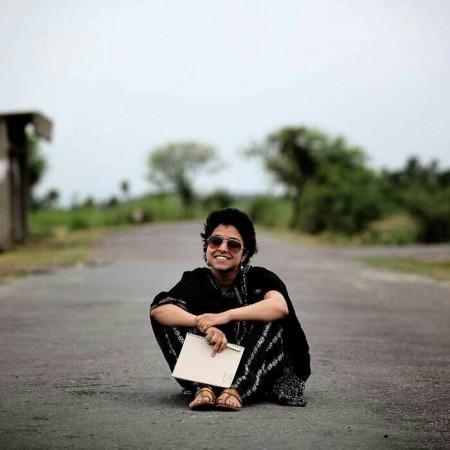
There are people and then there are fighters, said one among the many obituaries that flooded social networking sites today for a 26-year-old girl, Sumegha Gulati. The journalist died of cancer on Friday.
Sumegha did not let cancer, that relapsed three times, and the graft versus host disease, where her own immune system attacked the transplanted stem cells (bone marrow), slow her down from pursuing anything in life, be it her love for food, clothes, travel or, most importantly, journalism.
Sumegha, who originally hailed from Delhi, was passionate about reporting from conflict-ridden zones. She was especially drawn to the Kashmir valley, where she broke away from the shackles of male-dominated newsrooms in Srinagar-based newspaper offices.
She was the first female reporter who worked full-time in Greater Kashmir, one of the leading dailies of the Valley, and reported on situations where even male counterparts would fear to tread.
Her grit, lively attitude and love for journalism won over the hearts of everyone she came in touch with, from Kashmir to Delhi. She continued her fiery reporting even as she fought Hodgkin's lymphoma (a rare cancer of white blood cells), the disease slowing down her body, and consistent chemotherapies making her lose her hair and strength.
Making rounds at the hospitals and doctor's offices, she not only underwent treatments but also reported on the state of affairs of cancer patients in India.
Through a series of stories, she exposed how those suffering from blood cancers and wish to undergo bone marrow transplants have to endure an endless wait for the surgery, many losing the battle mid-way.
Here is an excerpt from one of her stories that was published in Quint:
"While there is no data to conclusively show that the incidence of blood cancers is rising in India, the number of bone marrow transplants being performed in hospitals is steadily increasing each year.
Between 1986 and 2007, an average of 45 transplants were carried out each year at CMC Vellore, according to Dr Mammen Chandy, who headed its Department of Hematology for two decades. The number rose to 100 transplants and is now touching about 200 transplants each year.
Dr Chandy attributes the rise in transplants partly to an increasing rate of detection. "More people are being diagnosed now of hematological cancers,"Another reason for the rise is that senior oncologists see transplant as a "curative modality". Simply put, more physicians now refer patients for a transplant.
Despite the increase in centres and doctors, the waiting lists at all major transplant centres in the country is growing.The waiting period at Advanced Centre for Training, Research and Education in Cancer, a satellite institution of the Tata Memorial Hospital, ACTREC is particularly long, says Dr Navin Khattry, who heads its bone marrow transplant unit, because more people want to get treatment at the centre itself. "That's because we have our own funding models where patients who need a transplant but cannot afford it can also get treatment. NGOs and the hospital help arrange funds."
Sumegha underwent two bone marrow transplants, which did not work because her immune system reacted to the foreign cells.
An obituary written by her colleague and a friend, Pritha Chatterjee, in today's Indian Express has touched many people who did not know her or never met her.
When taking notes with her right hand started tiring her, she began to practice writing with her left hand. When she had a catheter put near her thigh to inject chemotherapy drugs in the last few months in Mumbai, she hid it with her clothes while interviewing a writer for another story on Indian television writers. When the lymphoma had enveloped her life, she found stories around it — bone marrow transplant facilities in India, doctors, patients, their stories. She found ways to sneak in queries to her own doctor at Tata hospital, till he started "rebuking" her. "P, you know in OPDs, as soon as I walk in, he calls out, yeh lo aa gayi journalist."
A moving blog post by Sumegha Gulati titled, "I dated Cancer," said:
I was declared cancer-free on my 23rd birthday by Dr. Lalit Kumar who is known as the Father of medical oncology in India.
Overjoyed, I headed to work. The December 16 Delhi gang rape trial had just begun and I had to cover it. Life seemed normal.
The only thing worse than cancer, is a cancer relapse. Three months later, I was diagnosed with a relapse, this time at Stage 3 which is much more aggressive."
Her infectious smile while she breathed her last at the Tata Memorial Hospital in Mumbai is proof of the inspiring life she lived.
Actress Lezlie met brave Journalist Sumegha Gulati battling Cancer at the Tata hospital: https://t.co/FDkjWWpKlT via @YouTube
— Lezlie Tripathy (@lezlietripathy) July 30, 2016








![BJP fields Tashi Gyalson for Ladakh; drops sitting MP [details]](https://data1.ibtimes.co.in/en/full/797185/bjp-fields-tashi-gyalson-ladakh-drops-sitting-mp-details.jpg?w=220&h=138)








![BJP fields Tashi Gyalson for Ladakh; drops sitting MP [details]](https://data1.ibtimes.co.in/en/full/797185/bjp-fields-tashi-gyalson-ladakh-drops-sitting-mp-details.jpg?w=220&h=135)